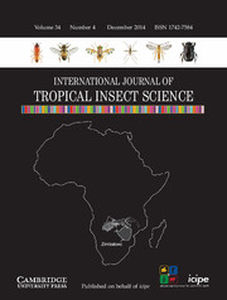Article contents
Developmental and reproductive biologies of the parasitic wasp, Biosteres longicaudatus, reared on hosts treated with a chitin synthesis inhibitor
Published online by Cambridge University Press: 19 September 2011
Abstract
Larvae of the Caribbean fruit fly, Anastrepha suspensa Loew (Diptera: Tephritidae) parasitized by the wasp, Biosteres longicaudatus Ashmead (Hymenoptera: Braconidae), were topically treated with diflubenzuron (Dimilin®), a chitin synthesis inhibitor, at 100, 500 and 1000 ppm. Each dosage was initiated during the parasite's egg stage, each of four larval stages and the pupal stage (pharate pupa + pharate adult). Adults emerging from all immature stages treated with the two higher dosages were significantly (P < 0.05) fewer than the controls. Developmental stages, in decreasing order of susceptibility to diflubenzuron were: egg, first instar, pharate adult, pharate pupa and larval stages two to four. Abnormally developed ovipositors occurred in some adults which emerged from eggs, pharate pupa and pharate adults that were treated with the two higher concentrations. Such females were unable to successfully locate and parasitize hosts. Females with normal ovipositors which emerged from treated eggs and pharate adults were able to find and attack hosts but had significantly fewer eggs in their ovaries and oviposited less than the controls. The F1 eggs laid by these females developed normally and survived to adulthood with no apparent abnormalities.
Keywords
- Type
- Research Article
- Information
- International Journal of Tropical Insect Science , Volume 1 , Issue 4 , December 1981 , pp. 403 - 406
- Copyright
- Copyright © ICIPE 1981
References
REFERENCES
- 1
- Cited by


